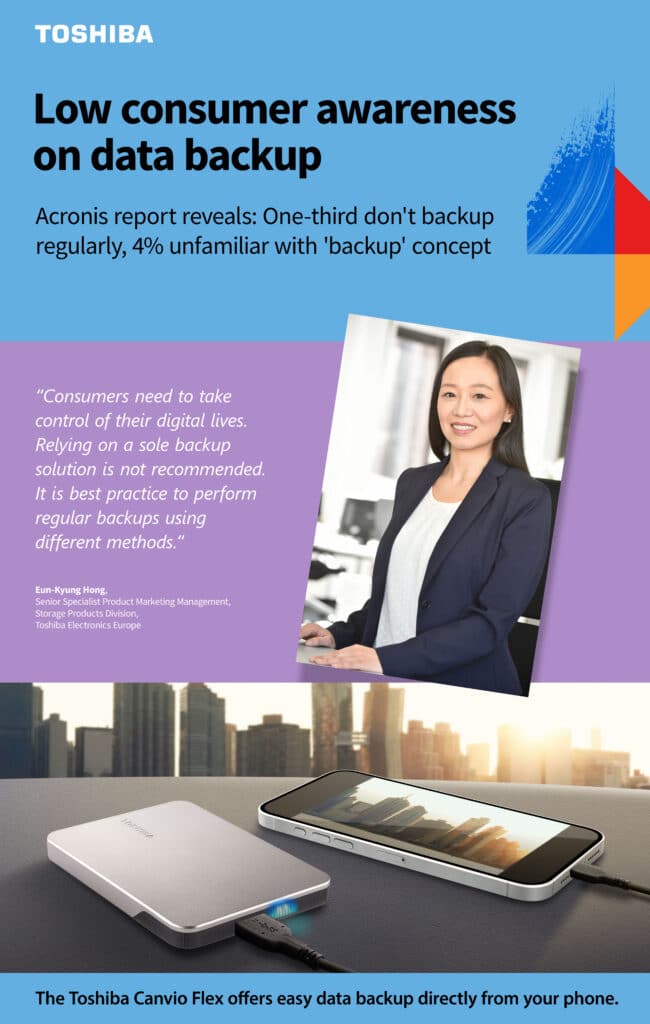26.03.2025
World Backup Day: Toshiba highlights the importance of data resilience
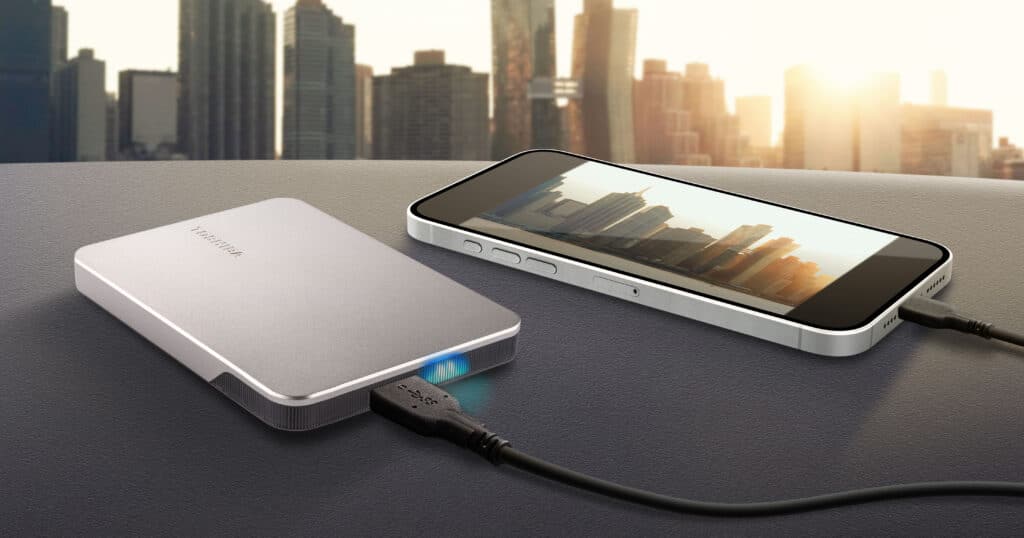

Düsseldorf, Germany, 26 March 2025 – Toshiba Electronics Europe GmbH (Toshiba) emphasises the importance of this year’s World Backup Day. Observed annually on the 31st of March, it serves as a reminder of the critical importance of regular data backups to ensure data resilience.
Data is increasingly recognised as one of our most valuable assets, the significance of data backup cannot be overstated – yet consumer awareness levels remain relatively low. A recent independent report by Acronis, a global cyber protection company, reveals that of the 2,500 consumers surveyed, about a third of the respondents said that they do not backup their data regularly. More concerning is that 4%, which equates to 100 people, do not even know what ‘backup’ means.
“Consumers need to take control of their digital lives,” says Eun-Kyung Hong, Senior Specialist Product Marketing Management, Storage Products Division, Toshiba Electronics Europe GmbH. “Our smartphones store photos, videos, contacts, passwords, and more. Most people use some form of cloud storage for backup, but relying on it as a sole solution is not recommended. It is best practice to perform regular backups using different methods. This could be a combination of cloud services or a mix of cloud and external storage, such as a USB-connected portable hard drive like a Toshiba Canvio Flex.”
Toshiba’s Canvio Flex external hard drive allows users to backup their data directly from their smartphone – without needing a laptop or PC. It also works interchangeably with most major device platforms and operating systems. Preformatted for Macs, Windows PCs, smartphones, and tablets*, this hard drive allows seamless access to data and sharing between devices. https://www.canvio.jp/en/compati/hdd/ot_ehdd/flex/index.htm
For more information about the Toshiba Canvio Flex, please visit: https://www.toshiba–storage.com/products/canvio–flex/
12.03.2025
Toshiba expands storage evaluation services in EMEA with new HDD Innovation Lab
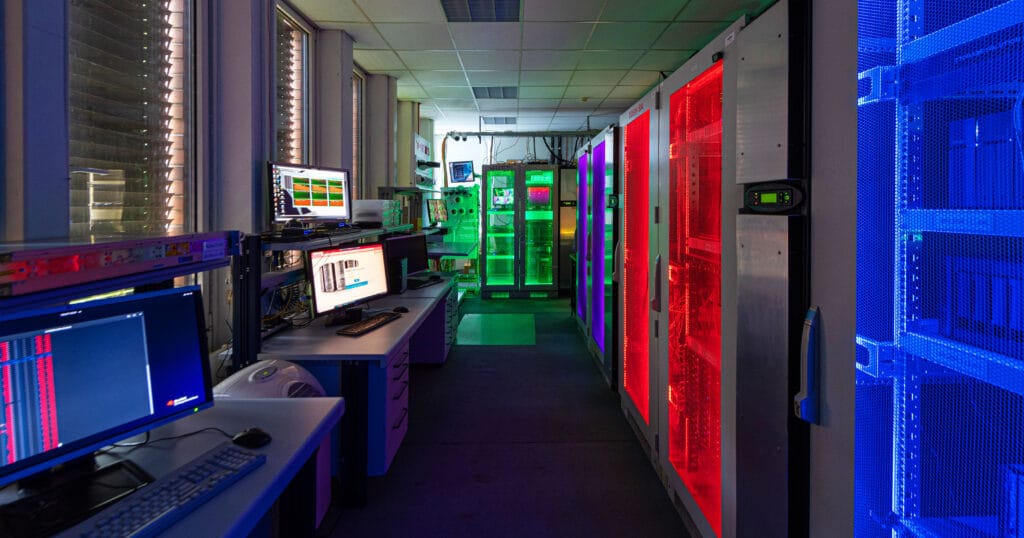
The facility focuses on optimising hard disk drive configurations in cloud storage, surveillance and NAS systems
Düsseldorf, Germany, 12 March 2025 – Toshiba Electronics Europe GmbH (Toshiba) has inaugurated a new HDD Innovation Laboratory (HDD Innovation Lab) at its site in Düsseldorf, Germany. The facility expands Toshiba’s HDD (hard disk drive) evaluation capabilities to customers and partners in Europe and the Middle East, supporting them in identifying the optimal HDD setups for their applications. Its main purpose will be the evaluation of HDD configurations for larger IT such as storage area networks (SAN), network-attached storage (NAS), surveillance systems and cloud storage.
“This new HDD Innovation Lab represents a significant leap forward in providing bespoke solutions and advancing HDD technology,” said Rainer W. Kaese, Senior Manager, HDD Business Development at Toshiba Electronics Europe GmbH. “It demonstrates Toshiba’s commitment to drive the industry forward and support customers and partners with technical expertise and resources. We look forward to strengthening existing collaborations and exploring the future business opportunities the new facility will bring.”
Comprehensive testing services
At the core of the Lab’s capabilities is the evaluation of HDDs and customer-specific architectures. It provides a platform for Proof-of-Concept activities and the configuration of unique architecture setups. A key feature of the Lab is its ability to conduct benchmarking across various architectures. It brings together all the essential components needed for benchmarking hard disk drive-based storage architectures such as different servers, JBoDs (Just a Bunch of Disks), chassis, controllers, cable and software for operating systems, video management and storage. The facility is also equipped with accurate power analyzing equipment for energy consumption benchmarks.
Sharing knowledge
Post-evaluation, the HDD Innovation Lab provides tailored responses to customer questions, ensuring that the insights gained from rigorous testing are shared effectively. It will also conduct internal investigations into the performance and optimisation of its own ranges of HDDs. The results, in the form of whitepapers and lab reports, are made available on the Toshiba Storage website.
To further support customer engagement, the Lab offers additional services such as the shipment of loan samples for self-evaluation. This service is available for both smaller and larger quantities, ensuring that customers can thoroughly assess the devices in their own environments.
Toshiba will also use the facility to host live demonstrations for Enterprise, Surveillance, and NAS/SAN applications at forthcoming trade fairs, sharing knowledge and showcasing the latest advancements in storage solutions.
More information about the HDD Innovation Lab can be found here: https://www.toshiba-storage.com/hdd-innovation-lab.
A virtual video tour of the new HDD Innovation Lab is available here: Link to final video to be added (if available)
For more information about Toshiba HDDs visit: www.toshiba-storage.com .
14.01.2025
Toshiba Unveils New Canvio Flex and Canvio Gaming 2.5” Portable Hard Drives

Stylish portable units deliver high performance, convenience and interoperability
Düsseldorf, Germany, 14 January 2025 – Toshiba Electronics Europe GmbH (Toshiba) has unveiled new designs for its Canvio Flex and Canvio Gaming 2.5-inch[1] portable hard drives (HDDs). The stylish, lightweight, and functional units offer simple plug-and-play operation with USB3.2 Gen1 and capacities of 1TB[2], 2TB, and 4TB.
Catering to the needs of the modern digital lifestyle, the Canvio Flex presents itself in an elegant, warm silver finish, embodying a stylish portable storage solution that delivers unparalleled flexibility. With the inclusion of both USB Type-C®[3] and Type-A cables, this compact and lightweight HDD can effortlessly connect to Android and iOS smartphones and tablets, Macs and Windows PCs and other compatible devices[4], without the need for reformatting. This cross-device feature allows families, students, professionals, digital nomads and travellers to securely backup and access their important files and cherished memories, even on the go.
Tailored for gamers who need extra game space, the Canvio Gaming is a great choice. Its sleek dark grey metallic finish and blue LED complement the design of the latest gaming consoles[5]. Moreover, the Canvio Gaming features an ‘always on’ mode, allowing for quicker resume times for ongoing games and quick response times when moving to the next gameplay.
“Since their initial release, our Canvio Flex and Canvio Gaming external hard drives have experienced a robust uptake in the market, providing customers with straightforward and convenient data storage solutions for specific user scenarios,” stated Larry Martinez-Palomo, Vice President of the Storage Products Division at Toshiba Electronics Europe. “With the introduction of new sleek and stylish designs, we are making them even more enticing, and this is sure to be met with appreciation.”
The new Toshiba Canvio Flex and Canvio Gaming hard drives will be available in 1Q 2025.
More information on the Canvio Flex can be accessed by visiting:
https://www.toshiba-storage.com/products/canvio-flex/
More information on the Canvio Gaming can be accessed by visiting:
https://www.toshiba-storage.com/products/canvio-gaming/
[1] “2.5-inch“ means the form factor of HDDs. They do not indicate drive‘s physical size.
[2] One Terabyte (TB) means one trillion bytes. Total available capacity will vary based on operating environment, and your results and storage capacity will vary accordingly. A computer operating system, however, reports storage capacity using powers of 2 for the definition of 1 GB = 230 = 1 073 741 824 bytes and 1 TB = 240 = 1 099 511 627 776 bytes and therefore shows less storage capacity.
[3] USB Type-C® and USB-C® are only for use with products based on and compliant with the USB Type-C® cable and connector specification.
[4] Compatibility with the Canvio Flex may vary depending on user‘s hardware configuration and operating system. Please check device compatibility and connecting instructions by reviewing the applicable user manuals for such device. The latest information can be viewed online under https://www.canvio.jp/en/compati/hdd/ot_ehdd/flex/index.htm.
[5] The latest information on the compatible game consoles for the Canvio Gaming can be viewed online under https://www.canvio.jp/en/compati/hdd/ot_ehdd/game/index.htm.
* USB Type-C® and USB-C® are registered trademarks of USB Implementers Forum.
* Android is a trademark of Google LLC.
* Mac is a trademarks of Apple Inc.
* Microsoft and Windows are trademarks of the Microsoft group of companies.
*Other company names, product names, and service names mentioned herein may be trademarks of their respective companies.
* Information in this document, including product prices and specifications, content of services and contact information, is current and believed to be accurate as of the date of the announcement, but is subject to change without prior notice.
###
05.11.2024
Toshiba Collaborates with PROMISE Technology on Providing the Optimal Data Storage Technology for CERN’s Large Hadron Collider
New video on the long-term cooperation is now live
Düsseldorf, Germany, 5 November 2024 – Toshiba Electronics Europe GmbH (Toshiba) today announces a new video that showcases its successful partnership with PROMISE Technology to deliver enhanced data storage capabilities to CERN, the European Organization for Nuclear Research, home to the world’s largest and most powerful particle accelerator, the Large Hadron Collider (LHC). The video explores how the collaborative partnership has been instrumental in fulfilling CERN’s mission by delivering robust storage systems and cutting-edge hard drives to support its groundbreaking research.
The LHC’s collision detectors, which run 24/7, generate approximately 1TB of data per minute, necessitating robust and reliable data storage. Since 2008, CERN has used PROMISE Technology’s 24-bay JBOD VTrak J5800 HDD enclosures, with some of the earliest systems still operational today. CERN has also used Toshiba’s Enterprise Capacity HDDs, starting with capacities of 4TB[1] over ten years ago to the MG09 Series Enterprise Capacity 18TB HDDs.
During this time, the two companies supported CERN in scaling up the storage capacity at its central data center, which sends this data to more than 170 research institutes around the world for analysis. Today, this storage system has reached a capacity of more than one Exabyte, which is one thousand Petabytes or a million Terabytes, realized with more than 120,000 HDDs sitting in more than 4,000 JBOD enclosures.
Building on this success, PROMISE Technology developed a new 60-bay JBOD model, the VTrak J5960. The JBOD storage system incorporates ‘Greenboost’ technology, a suite of energy-saving innovations that can reduce power consumption by up to 30%. In the HDD application lab, Toshiba completed early testing PROMISE Technology’s 60-bay JBOD with its Enterprise Capacity MG10 Series 20TB HDDs, and confirmed data- and cooling performance and power efficiency, which aligns with the global push towards more sustainable and environmentally friendly data management practices.
About this collaboration achievement in data storage Eric Bonfillou, Debuty Group Leader of CERN’s IT Fabric group states: “In our quest to unravel the mysteries of the universe, we need partners who understand the importance of data storage, reliability, and efficiency with solutions that are tailored to our unique needs.”
“The energy crisis is now a real challenge to all enterprises, including CERN,” Alice Chang, Chief Marketing Officer, PROMISE Technology. “The VTrak J5960 offers a well-rounded solution to solve this dilemma, and we are confident that Toshiba’s Enterprise Capacity HDDs, installed and operated in this JBOD, will support CERN’s future need for growing data storage capacity in a reliable and energy-efficient way.”
“At Toshiba, we are very proud to support CERN’s activities with Enterprise Capacity HDDs,” says Rainer W. Kaese, Senior Manager Business Development, Storage Products Division at Toshiba. “We continue to develop higher capacities, up to 30TB and beyond, as HDDs are and will remain essential for storing the exabytes of data that CERN and the entire world produce in a cost-effective and energy-efficient manner.”
While the video celebrates the collaborative work with CERN, the focus remains on the technological advancements and the future of data storage at the research facility. Toshiba and PROMISE Technology are committed to providing solutions that ensure the LHC’s research continues without interruption, contributing to our understanding of the universe.
You can watch the new video here: https://youtu.be/1zuEVfu77QQ
For more information on Toshiba’s full line of HDD storage products, please visit: toshiba-storage.com or toshiba.semicon-storage.com.
Notes:
[1] Definition of capacity: One terabyte (TB) = one trillion bytes, but storage capacity actually available may vary depending on the operating environment and formatting. Available storage capacity (including examples of various media files) will vary based on file size, formatting, settings, software and operating system and/or pre-installed software applications, or media content. Actual formatted capacity may vary.
* Information in this document, including product prices and specifications, content of services and contact information, is current and believed to be accurate as of the date of the announcement, but is subject to change without prior notice.
* Company names, product names, and service names mentioned herein may be trademarks of their respective companies.
###
About PROMISE Technology:
PROMISE Technology is a recognized global leader in streaming data storage with more than 30 years of experience. Powered by its proprietary PromiseRAID and Boost Family of technologies, the brand’s innovative solutions are tailored to the Surveillance, Rich Media, Cloud and IT markets’ unique needs. PROMISE’s highly experienced sales and engineering teams are strategically located throughout the Americas, EMEA, JAPAC, and China regions to provide unparalleled services and support to its customers around the globe.
For more information, please visit: https://www.promise.com/
10.09.2024
Toshiba Announces 24TB CMR and 28TB SMR Enterprise Hard Disk Drives
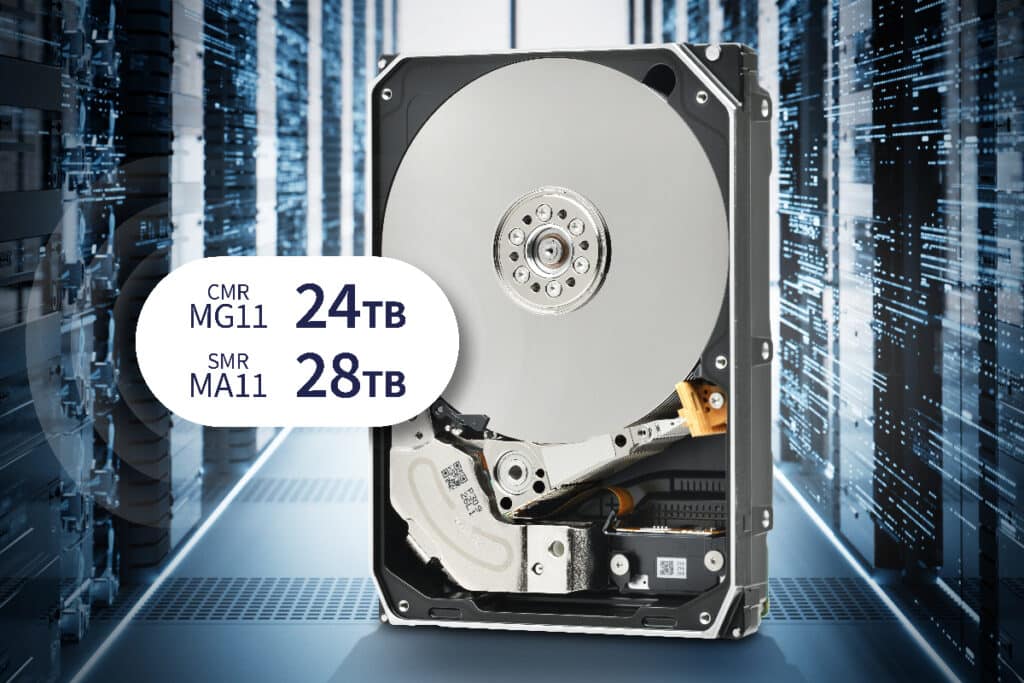
Mx11 family for hyperscalers and data centers delivers new levels of density and power efficiency
Düsseldorf, Germany, 10 September 2024 – Toshiba Electronics Europe GmbH (Toshiba) announces the Mx11 family of helium-sealed Enterprise Capacity HDDs. The Mx11 family includes the MG11 Series, which provides capacities of up to 24TB[1] using conventional magnetic recording (CMR), and the MA11 Series, which offers up to 28TB capacities with shingled magnetic recording (SMR).
The new Mx11 family is designed to deliver new levels of density and power efficiency to customers tasked with controlling (or managing) operational costs while meeting the relentless demands of data growth. Built on a common architecture, both products feature a 10-disk, helium-sealed, standard 3.5-inch[2] 7,200rpm design that leverages Toshiba’s innovative flux control microwave assisted magnetic recording (FC-MAMR™) technology. Engineered for higher performance and 24/7 reliability, the Mx11 family is designed with a 1GiB[3] buffer, a workload[4] rating of 550TB per year, an MTTF/MTBF[5] of 2.5 million hours, and an AFR[5] of 0.35%.
The MG11 CMR HDD Series enables cloud, data center, and enterprise storage customers to scale storage density within existing infrastructure rapidly. Built with a 1GiB buffer, the new 24TB HDD is faster[6] than its predecessor, with an approximately 9% faster maximum sustained transfer speed of 295MiB/s[7]. With a choice of 6Gbps SATA or 12Gbps SAS interfaces, the MG11 Series fits seamlessly into any data center to support data storage, online backup and archive, and video surveillance applications. In addition, for enhanced security[8], the MG11 Series is available with sanitize instant erase (SIE) and self-encrypting drive (SED) options.
The MA11 Series achieves 2.8TB per disk using SMR technology. The host-managed SMR increases drive capacity by overlapping the physical tracks on the disk during write operations. Data centers with software that can optimize such a design will benefit from improved cost efficiencies through higher storage densities. The new MA11 Series is available in 28TB and 27TB capacities with a 6Gbps SATA interface and with SED options for enhanced security.
“Backed by 50 years of continuous HDD innovation, the Mx11 Series delivers new levels of capacity and total cost of ownership (TCO) efficiency, enabling customers to optimize operational costs while expanding their data center infrastructure,” said Larry Martinez-Palomo, Vice President, Head of Storage Products Division, Toshiba.
Sample shipments of the MG11 Series will start this month, and the MA11 Series in the fourth calendar quarter of this year.
For more information on the new products, please visit:
MG11: https://www.toshiba-storage.com/products/enterprise-capacity-hard-drive-mg-series/
MA11: https://toshiba.semicon-storage.com/eu/storage/product/data-center-enterprise.html
Please download the Press Release here.
For more information on Toshiba’s full line of HDD storage products, please visit: toshiba-storage.com or toshiba.semicon-storage.com.
Notes:
[1] Definition of capacity: One terabyte (TB) = one trillion bytes, but the actual available storage capacity may vary, depending on the operating environment and formatting. Available storage capacity (including examples of various media files) will vary based on file size, formatting, settings, software and operating system and/or pre-installed software applications, or media content. Actual formatted capacity may vary.
[2] “3.5-inch” is the form factor of HDDs. It does not indicate the drive’s physical size.
[3] A gibibyte (GiB) is 230, or 1,073,741,824 bytes.
[4] Workload is a measure of data throughput in a year. It is defined as the amount of data written, read or verified by commands from the host system.
[5] MTTF/MTBF (mean time to failure/mean time between failure) and AFR (annualized failure rate) is not a guarantee or estimate of the product life; rather it is a statistical value related to mean failure rates for a large number of products, which may not accurately reflect actual operation. AFR is defined as the annual operating hours divided by the mean time to failure. The actual product life of the product may vary.
[6] Comparison between the SATA interface 512e model “MG11ACA24TE” and the previous generation “MG10AFA22TE.”
[7] A mebibyte (MiB) is 220, or 1,048,576 bytes. Read and write speeds may vary depending on the host device, read and write conditions, and file size.
[8] The HDDs with any optional security function may not be available in countries where such HDDs are prohibited or limited due to export control and local regulations.
* Information in this document, including product prices and specifications, content of services and contact information, is current and believed to be accurate as of the date of the announcement, but is subject to change without prior notice.
* FC-MAMR™ is a trademark of Toshiba Devices & Storage Corporation.
* Other company names, product names, and service names may be trademarks of their respective companies.
22.08.2024
Toshiba’s next-generation S300 Pro Surveillance HDDs for large-scale video surveillance systems
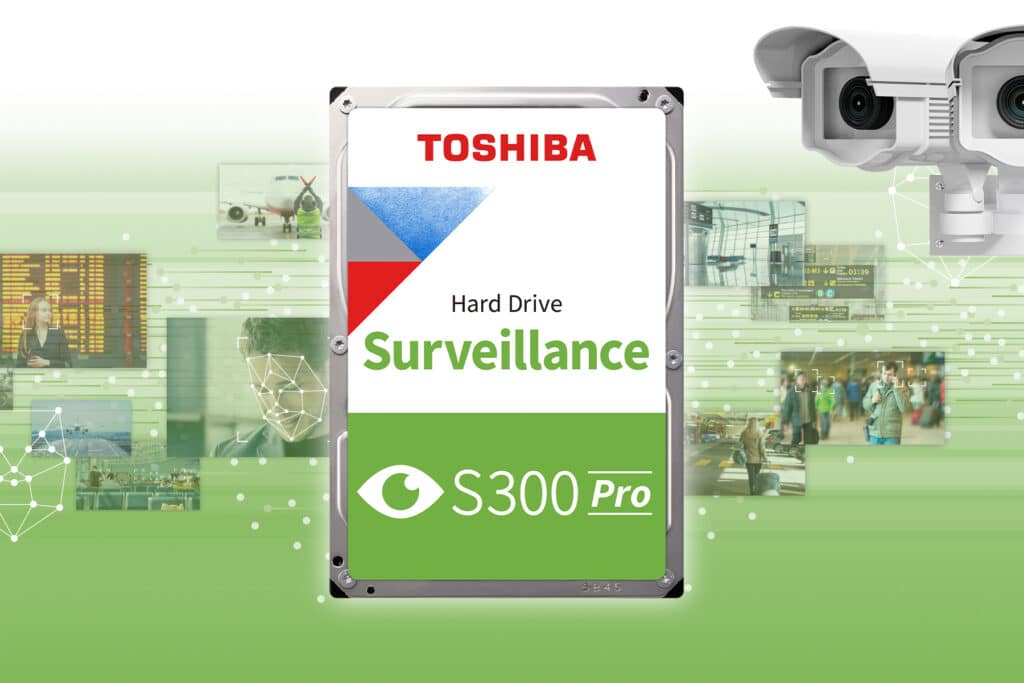
The next-generation S300 Pro Surveillance HDDs deliver enhanced performance, reliability and power efficiency
Düsseldorf, Germany, 22 August 2024 – Toshiba Electronics Europe GmbH (Toshiba) announces its next-generation S300 Pro Surveillance Hard Disk Drives (HDDs) targeting the latest requirements in the surveillance storage market. With capacities up to 10TB[1] and double the buffer size[2], the upgraded HDDs with conventional magnetic recording (CMR) technology enable surveillance system integrators, system installation providers, and end users to record, store and analyse their video streams from up to 64 high-definition (HD) cameras[3].
The high scalable, 3.5-inch[4] S300 Pro Surveillance HDDs, with capacity options of 4TB, 6TB, 8TB and 10TB, now support up to 24 bays, making them an excellent fit for large-scale video recording systems, delivering reliable operation even in the most demanding environments. Additionally, compared to the previous generation, the new S300 Pro provides a higher maximum sustained transfer speed of 268MiB/s[5] and doubles the cache buffer size to 512MiB[6]. The S300 Pro HDDs also reduce power consumption, delivering improved total cost of ownership (TCO).
With 24/7 operation, an enhanced annual workload of 300TB[7] and mean time to failure (MTTF) of up to 1.2 million hours[8], the S300 Pro can handle the increasing video analysis demands of mission-critical surveillance footage. The next-generation S300 Pro’s extended warranty period, from 3 to 5 years, demonstrates Toshiba’s high durability and engineering quality of its HDDs[9].
“Specially optimised for large-scale video surveillance operations, where advanced video analytics, face recognition and editing are mission-critical features, Toshiba’s next-generation S300 Pro delivers enhanced performance, durability, and 24/7 reliability,” says Larry Martinez-Palomo, Vice President, Head of Storage Products Division, Toshiba. “The next-generation S300 Pro Surveillance HDDs demonstrate Toshiba’s commitment to continuously collaborate with industry-leading video surveillance system manufacturers and empower our partners and customers to benefit from our range of high-quality Surveillance HDD portfolio.”
The next-generation S300 Pro Surveillance HDDs will be available in CQ4 2024.
For more information about the next-generation Toshiba S300 Pro Surveillance HDDs, please visit: https://www.toshiba-storage.com/products/s300-pro-surveillance-hard-drive/ .
Please download the Press Release here.
For more information on Toshiba’s full line of HDD storage products, please visit: https://www.toshiba-storage.com/ .
Notes:
[1] Definition of capacity: One terabyte (TB) = one trillion bytes, but storage capacity actually available may vary depending on the operating environment and formatting. Available storage capacity (including examples of various media files) will vary based on file size, formatting, settings, software and operating system and/or pre-installed software applications, or media content. Actual formatted capacity may vary.
[2] Compared to the previous generation of S300 Pro Surveillance HDDs: https://www.toshiba-storage.com/products/s300-pro-surveillance-hard-drive/
[3] Number of surveillance cameras support capability is defined by performance simulation with high-definition cameras at 10Mbit/s rate. Actual results may vary based on various factors, including the types of cameras installed, the system’s hardware and software capabilities, the video compression technology used, and system variables such as resolution, frames per second, and other settings.
[4] “3.5-inch“ means the form factor of HDDs. They do not indicate drive‘s physical size.
[5] Read and write speed may vary depending on the host device, read and write conditions, and file size.
[6] A mebibyte (MiB) means 1 048 576 bytes.
[7] Workload is a measure of the data throughput of the year, and it is defined as the amount of data written, read or verified by commands from the host system.
[8] MTTF/MTBF (Mean Time to Failure/Mean Time Between Failures) is not a guarantee or estimate of product life; it is a statistical value related to mean failure rates for a large number of products which may not accurately reflect actual operation. The actual operating life of the product may be different from the MTTF/MTBF.
[9] Operation at a high surface temperature will shorten the drive’s useful life. The recommended operating condition is less than +60°C.
* Information in this document, including product prices and specifications, content of services and contact information, is current and believed to be accurate as of the date of the announcement, but is subject to change without prior notice.
* Company names, product names, and service names mentioned herein may be trademarks of their respective companies.
14.05.2024
Toshiba Successfully Demonstrates Nearline HDDs with Massive Capacity of Over 30 Terabytes
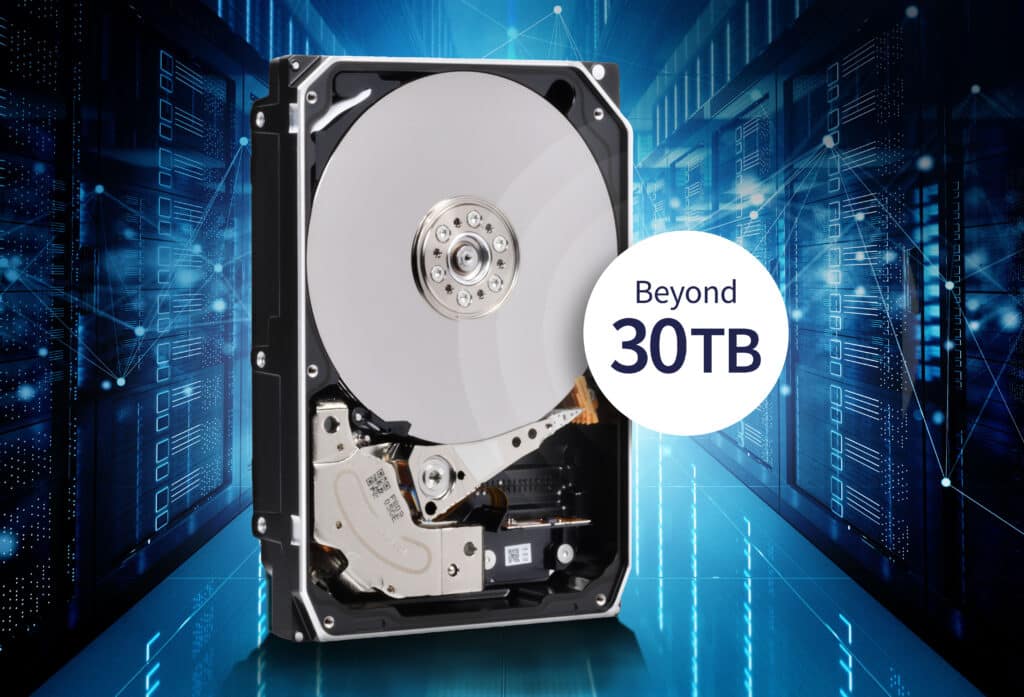
Düsseldorf, Germany, 14 May 2024 – Toshiba Electronics Europe GmbH announces that Toshiba Electronic Devices & Storage Corporation (Toshiba) has successfully achieved storage capacities of over 30TB[1] with two next-generation large capacity magnetic recording technologies for hard disk drives (HDDs): Heat Assisted Magnetic Recording (HAMR) and Microwave Assisted Magnetic Recording (MAMR). The demonstration drives represent a major milestone in the advance towards commercial products based on each of these emerging recording formats.
HAMR boosts writing capabilities by locally heating the disk material with a near-field laser. Toshiba achieved 32TB on 10 disks using Shingled Magnetic Recording (SMR) – a technology that partially overlaps data tracks to increase the areal density and overall storage capacity per disk. Toshiba plans to start shipping test sample HDDs[2] of 28 – 30TB with HAMR technology in 2025.
The other technology is MAMR, which uses microwaves to enhance magnetic recording capabilities. Toshiba was the first [3] to demonstrate its effectiveness and started mass production of first-generation drives in 2021. Toshiba achieved 31TB capacity by stacking 11 disks, using SMR technology, and improving signal processing.
These new achievements were made possible through years of close collaborative work with Resonac Corporation, a HDD media manufacturer, and TDK Corporation, a HDD head manufacturer. Toshiba and its working partners are committed to continue developing both HAMR and MAMR technologies in order to provide higher capacity HDDs to meet the growing storage demand of the cloud and datacenters.
As Larry Martinez-Palomo, Vice President, Head of Storage Products Division at Toshiba, explains: “Toshiba is concurrently advancing the development of future generation high-capacity HDDs using both HAMR and MAMR technologies. Mass production of hard disk drives incorporating HAMR will commence after the validation phase is completed. In the interim, Toshiba will continue to satisfy the demand for high-capacity, high-reliability storage devices with hard disk drives employing the field-proven MAMR technology.”
At ISC High Performance 2024, May 12th to 16th in Hamburg, Germany, Toshiba and its partners will discuss with experts, how its hard disk drive technologies and enterprise portfolio are streamlined to meet the needs of large and fast online backend storage. On the stand (G02), there will be a live demo showing the astonishing performance of Toshiba’s HDD MG Series. For more details, please visit the Toshiba website at: https://toshiba.semicon-storage.com/eu/company/exhibition/articles/storage_ISC_2024.html
For more information on Toshiba’s full line of HDD storage products please visit www.toshiba.semicon-storage.com or www.toshiba-storage.com .
[1] Definition of capacity: One terabyte (TB) = one trillion bytes, but storage capacity actually available may vary, depending on operating environment and formatting. Available storage capacity (including examples of various media files) will vary based on file size, formatting, settings, software and operating system and/or pre-installed software applications, or media content. Actual formatted capacity may vary.
[2] The test sample capacity aims for 28 to 30TB with Conventional Magnetic Recording (CMR) format.
[3] Toshiba research, as of December 24, 2021
* Information in this document, including product prices and specifications, content of services and contact information, is current and believed to be accurate as of the date of the announcement, but is subject to change without prior notice.
* Company names, product names, and service names mentioned herein may be trademarks of their respective companies.
21.03.2024
World Backup Day: Toshiba Encourages People to Backup Their Data Regularly

Canvio Flex smart storage drive simplifies the backup of mobile devices, even on the go
Düsseldorf, Germany, 21 March 2024 – Toshiba Electronics Europe GmbH (Toshiba) emphasises the importance of this year’s World Backup Day on 31 March, the day to prevent data loss. This independent initiative responds directly to concerns about data loss on devices like laptops and smartphones and raises awareness about the value of backups and data preservation. Toshiba’s Canvio Flex external hard disk drive makes mobile device backups even more accessible by allowing users to make copies of important files directly from their smartphone – without needing a laptop or PC.
According to research undertaken by numerous groups, only a tiny percentage of people make frequent backups of their digital data. Even more concerning is that a significant section of our continually data-generating society never backs up, leaving them vulnerable to substantial data loss dangers. An independent survey conducted by Acronis, a world leader in cyber protection, reveals that 41% of all individual users rarely or never back up their computers or mobile devices. According to the most recent report, 72% of all users had to recover from backup at least once that year, implying that some users who did not back up had permanently lost data.
As Larry Martinez-Palomo, Vice President, Head of Storage Products Division, explains: “In a world that is becoming increasingly digital, the need for flexible storage solutions is growing. Photos, videos, and important documents accumulate on our devices – especially smartphones. World Backup Day helps raise awareness of the importance of backing up these files more regularly. The Toshiba Canvio Flex external hard drive makes backups easy – connect the USB cord to your smartphone or other device and drag and drop to secure the future of your digital files and memories.”
A backup plan is one of the most critical strategies to preserve and keep data safe. Backing up ensures that even if the device slips into the wrong hands, a backup of the most important files is retained, secure, and easily accessible. The Toshiba Canvio Flex works interchangeably with most major device platforms and operating systems. Preformatted for Macs, Windows PCs, smartphones, and tablets*, this drive allows seamless access to data, and sharing between devices.
* Please check out the Canvio Flex compatibility list: https://www.canvio.jp/en/compati/hdd/ot_ehdd/flex/index.htm
Please download the Press Release here.
26.09.2023
Toshiba Announces 22TB MG10F Series Hard Disk Drives
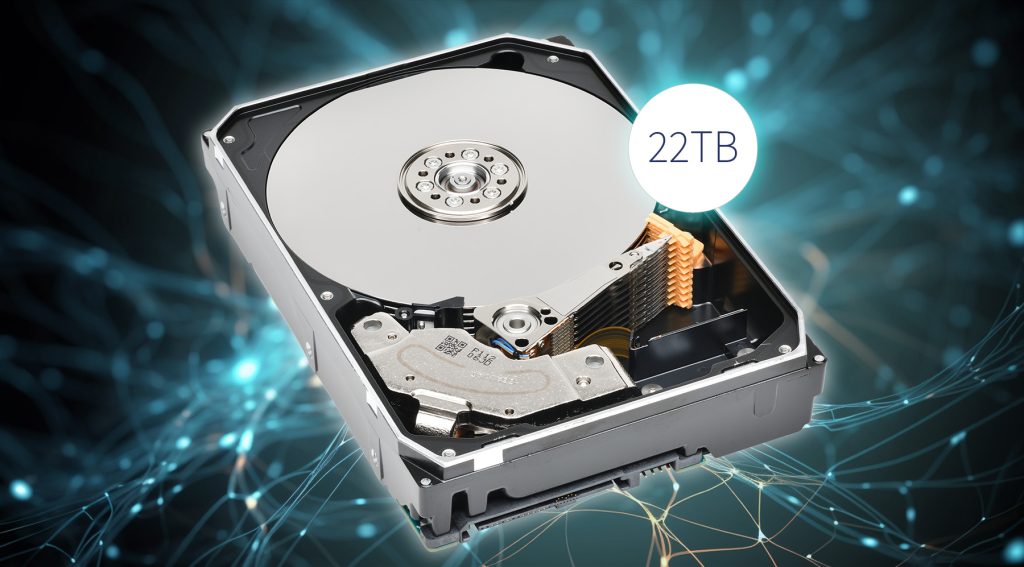
Toshiba Electronics Europe GmbH announces the release of its MG10F Series 22TB[1] HDD, a conventional magnetic recording (CMR) HDD that leverages Toshiba’s 10-disk helium-sealed design.
As a key building block in cloud and storage infrastructure, the MG10F 22TB delivers 10% more capacity than Toshiba’s prior generation 20TB model. Designed and engineered to meet their growing data storage needs of its largest customers, the MG10F 22TB HDDs are compatible with a wide range of applications and workloads for both cloud-scale and traditional data-center use cases. The increased capacity of the 22TB MG10F helps cloud-scale infrastructure build higher storage densities at a lower TCO.
The MG10F Series HDD features 7,200rpm performance, a 550TB per year workload rating[2], and a choice of SAS and SATA interfaces—all in a power-efficient helium-sealed, industry-standard 3.5-inch[3] form factor.
Sample shipments of the 22TB MG10F Series HDDs start immediately for SAS interface and in the fourth calendar quarter of this year for SATA interface.
More information on the new products
[1] Definition of capacity: One terabyte (TB) = one trillion bytes, but storage capacity actually available may vary, depending on operating environment and formatting. Available storage capacity (including examples of various media files) will vary based on file size, formatting, settings, software and operating system and/or pre-installed software applications, or media content. Actual formatted capacity may vary.
[2] Workload is a measure of data throughput in a year, and it is defined as the amount of data written, read or verified by commands from the host system.
[3] 3.5-inch means the form factor of HDDs. It does not indicate a drive’s physical size.
* Information in this press release, including product prices and specifications, content of services and contact information, is current and believed to be accurate as of the date of the announcement, but is subject to change without prior notice.
* Company names, product names, and service names mentioned herein may be trademarks of their respective companies.
16.08.2023
HDDs have a long life ahead in certain workloads
A Podcast by Antony Adshead, Rainer Kaese from Toshiba Electronics Europe
Listen to the podcast here: https://cdn.ttgtmedia.com/rms/editorial/podcastToshibaJuly23.mp3
Spinning disk hard drives are far from dead, and with data volumes set to explode, there are use cases that suit them well. That’s the view of Rainer Kaese of Toshiba in this podcast.
Some have predicted the imminent demise of spinning disk hard drives (HDDs), but Rainer Kaese, senior manager for business development in storage products at Toshiba Electronics Europe, argues they have many more years life left in them.
Core to his argument is that with the volume of data expanding rapidly, HDDs offer cost-effective storage that can cope with huge capacity needs and the right performance for particular workloads if their capabilities are harnessed correctly.
Antony Adshead: How long should we expect spinning disk HDDs to be around for in the enterprise, and why?
Rainer Kaese: That’s a really good question and there’s a clear answer: for many more years. So, at least five, if not 10, or even more years.
And there’s a quite simple reason: the data we have to store in enterprise and cloud is exploding. It’s growing exponentially and it has to be stored in a competitive way. People don’t want to pay all their money for it. And spinning disks are and will be the most economical way to store all these zettabytes of data.
If we compare it with SSDs [solid-state drives], the bit cost, the capacity cost of hard disk drives is currently around 1/7th. It used to be 1/10th. Now it is 1/7th, but if you look at the cost curve of the price per capacity of HDD and SSD they are dropping as parallel lines. And we know that parallel lines never meet.
So, hard disk drives are, and will always be, much cheaper in terms of cost per capacity than SSDs.
Adshead: What workloads will be most appropriate for HDDs in the coming five to 10 years? Here, we’re assuming flash will increase its share at the higher levels of performance.
Kaese: If it is about performance, if it is about throughput, agility, IOPS and things, then flash will lead.
However, there are all this petabytes and zettabytes of bulk data, and it’s not just what we know today. There will be more data coming out of this internet of things, Industry 4.0 – so much more data will be created and this data needs to be saved, stored and will also need to be analysed; that’s why we store this data.
And if you look at the storage landscape for that application where you are storing and analysing a lot of data, then on one hand, we can say that flash will be much more expensive. On the other hand, there is also tape. Tape is a lot cheaper than flash and tape is a lot cheaper than HDDs, but tape is not an online medium. So, for online storage […] and especially online analytics, tape cannot be used.
In this middle field of active online data, of massive amounts, that will be the playground for hard disk drives.
Adshead: How can spinning disk HDD compete against its solid-state rivals?
Kaese: If we talk about performance, we have to see that the HDD is way slower than any SSD. So, a single NVMe component is 5x to 20x compared to hard disk drives.
However, the HDD’s domain is large online storage, [and so] we don’t compare single components any more. Large online storage means a lot of hard disk drives. A lot of small HDDs can join their rather slow performance to one big, agile storage, and the industry has implemented many ways [to make] hard disk drives a little more agile. And this … leads to large online storage.
All these videos, this online data, it is instantly there, but it is coming from hard disk drives not from NVMe, and this is because HDDs have joined forces with many [of them to be] able to deliver the performance required.
09.05.2023
Toshiba attains Microchip Adaptec® interoperability assurance qualification for its flagship SAS-based HDDs
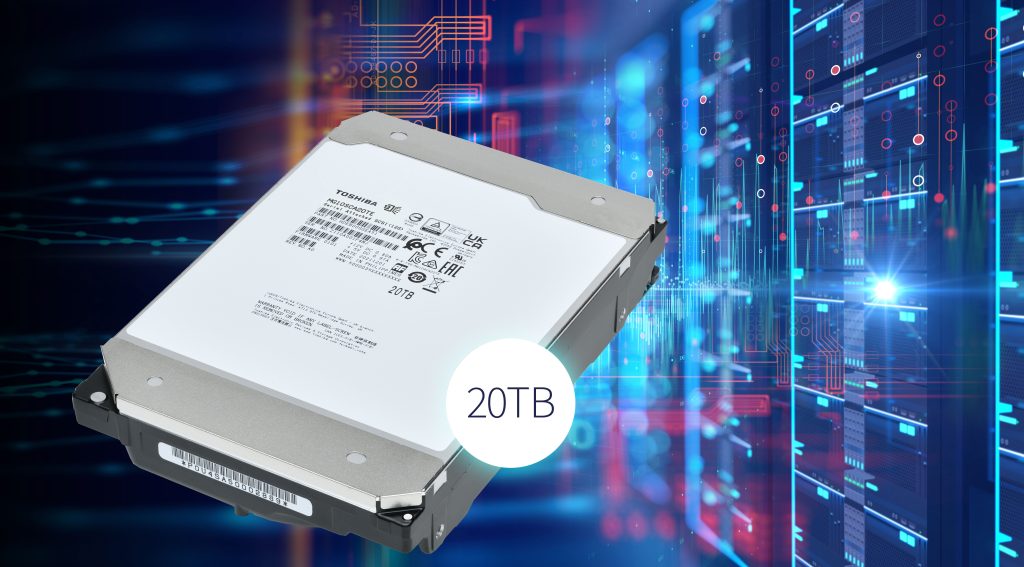
Düsseldorf, Germany, 9 May 2023 — Toshiba Electronics Europe GmbH has further underlined the application versatility of its hard disk drive (HDD) products. Having already shown the complete compatibility of certain models in its high-capacity MG10 Series with the Microchip Adaptec® redundant array of independent disks (RAID) controllers and host bus adapters (HBAs), extensive Microchip-conducted compatibility testing has been done in relation to further products.
SAS 12GB/s versions of the enterprise-grade MG10SCA20TE and MG10SCA20TA HDDs have gained certification in relation to both the Adaptec SmartRAID 31xx and 32xx storage adapter series. They have subsequently been added to the Microchip compatibility list that its customers refer to. This follows on from the SATA 6GB/s MG10ACA HDD model getting Adaptec SmartRAID 31xx/32xx interoperability qualification at the end of 2022.
Featuring elevated data storage capacities and SAS 12GB/s interfacing, the MG10SCA20TE/A HDDs from Toshiba are supplied in compact 3.5-inch form factors. They each feature a 10-disk arrangement, with a helium-filled design and a rotational speed of 7,200rpm.
As Rainer W. Kaese, Senior Manager Business Development Storage Products at Toshiba Electronics Europe GmbH, explains; “By having assured interoperability between Microchip and Toshiba products, thanks to the comprehensive testing work carried out by Microchip, we are making data storage implementation much easier for our customer base. It means that HDDs plus the accompanying HBAs and storage controllers can be sourced with total confidence in their combined operational performance and long-term reliability.”
13.12.2022
Toshiba Renews its Popular Streamlined Canvio Basics Hard Drive Series
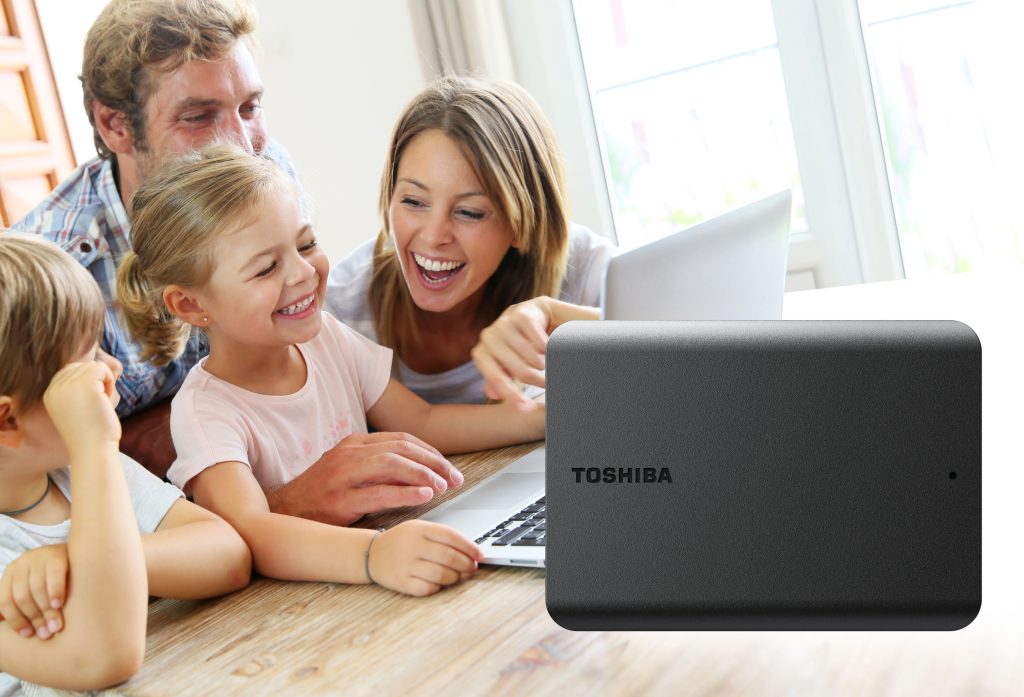
Düsseldorf, Germany, 13 December 2022 — Toshiba Electronics Europe GmbH has made further enhancements to its widely-adopted CANVIO BASICS series of portable hard drives. The new models offer the high storage capacities that customers need for leading increasingly data-centric lifestyles – while also having a stylish and compact design.
CANVIO BASICS 2.5” format hard drives have matt black finished enclosures, with dimensions of 78mm x 109mm x 14mm for the 2TB1 and 1TB versions, and 78mm x 109mm x 19.5mm dimensions for the 4TB version. Their compact form factors combined with lightweight construction (only 217.5g for the 4TB version, and less than 150g for all other versions) means they are easy to carry and take up very little room in bags or luggage, and can even fit into coat pockets.
These drives easily connect to laptop and PCs, making them a convenient plug-and-play storage solution. Their USB 3.2 Gen 1 interfaces allow transfer speeds of up to 5.0Gbit/s to be supported (though they are compatible with legacy USB 2.0 interfacing too). Powered directly from a connected USB source, they draw only minimal current.
CANVIO BASICS drives have been designed to offer assured long-term operational reliability. They are ready for use via Microsoft® Windows®, with no software installation necessary, while reformatting is required for macOS.
“Our CANVIO BASICS hard drives have seen really strong market uptake since their initial release, presenting customers with simple and convenient data storage solutions at attractive price points,” states Larry Martinez-Palomo, Vice President of the Storage Products Division at Toshiba Electronics Europe. “By continuing to enhance the value proposition of this series, we are making them even more alluring, and this is certain to be appreciated.”
The new Toshiba hard drive will be available in 1Q 2023.
More information on CANVIO BASICS may be accessed by going to:
https://www.toshiba-storage.com/products/canvio-basics/
For more information on Toshiba’s full line of HDD storage products, please visit:
https://www.toshiba-storage.com/
[1]. Definition of capacity: One terabyte (TB) = one trillion bytes, but storage capacity actually available may vary depending on operating environment and formatting. Available storage capacity (including examples of various media files) will vary based on file size, formatting, settings, software and operating system and/or pre-installed software applications, or media content. Actual formatted capacity may vary.

